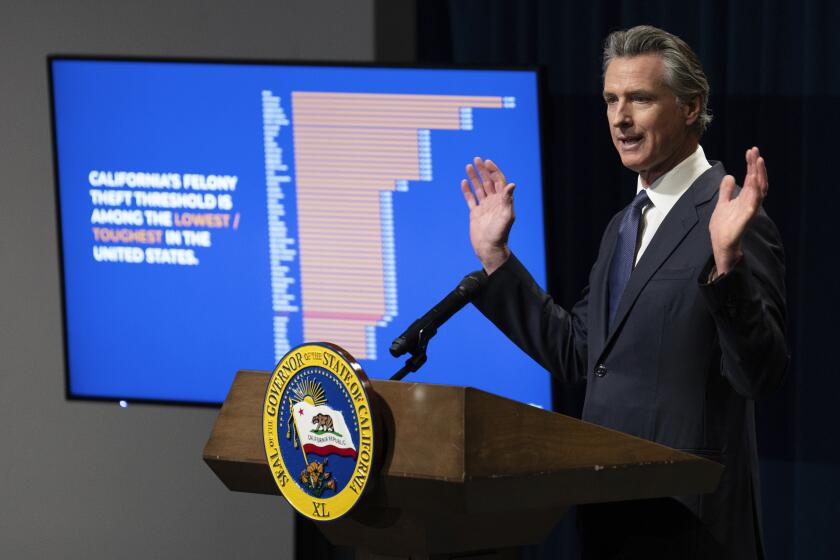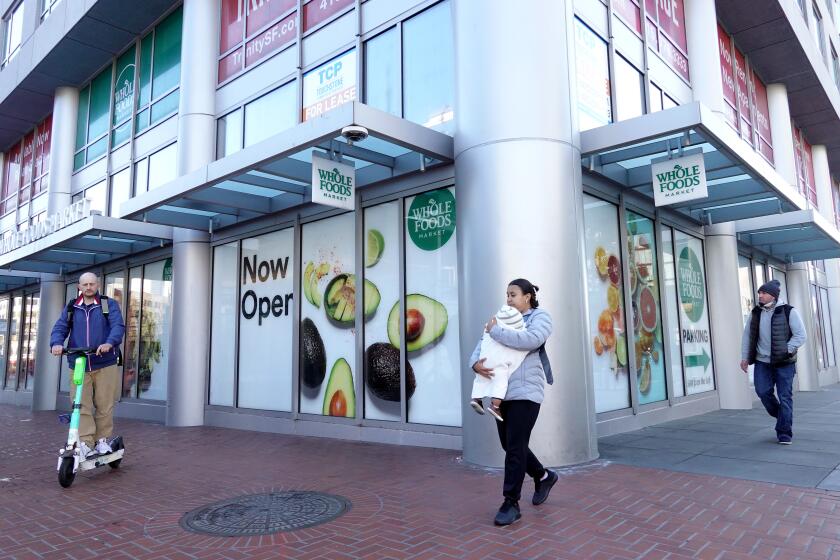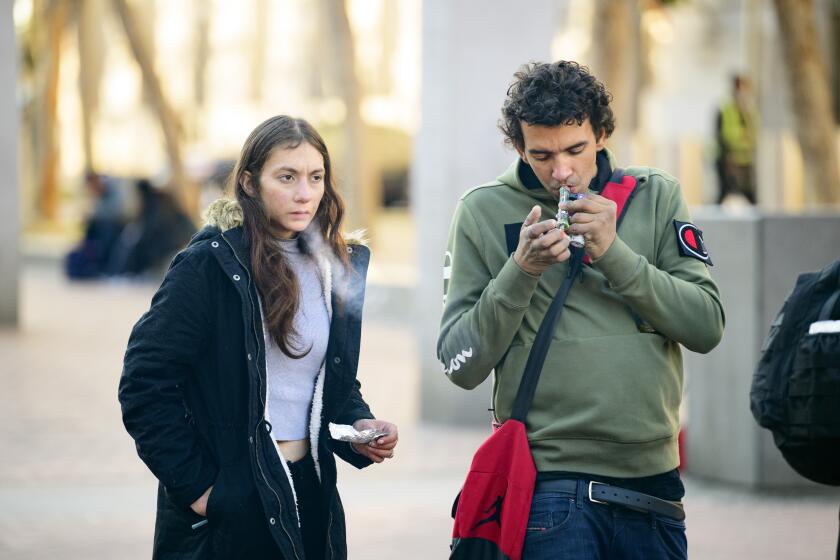Newsom to send 120 CHP officers to fight crime in Oakland

Gov. Gavin Newsom announced Tuesday that he’s sending 120 Highway Patrol officers to Oakland under a new state law enforcement campaign targeting an uptick in violent crime and theft that has placed political pressure on politicians, divided Democrats and bolstered criticism of California’s criminal justice policies.
Newsom’s decision to bolster police presence in Oakland comes amid a barrage of recent headlines on the city’s crime rates, business closures and campaigns to oust the city’s mayor and Alameda County’s chief prosecutor from office.
The problems in Oakland and blatant smash-and-grab retail crime in big cities across California have inspired debate about whether to reform Proposition 47, a ballot measure voters approved in 2014 that reduced some drug and theft felonies to misdemeanors as a way to lower incarceration rates and encourage people to seek treatment.
“What’s happening in this beautiful city and surrounding area is alarming and unacceptable,” Newsom said in a statement. “I’m sending the California Highway Patrol to assist local efforts to restore a sense of safety that the hardworking people of Oakland and the East Bay demand and deserve.”
The governor said he can relate to business owners and other residents angered by waves of smash-and-grab thefts from California stores.
Violent crime increased 21% in 2023 from the year before, according to the Oakland Police Department’s end-of-year crime report. Homicides topped 100 for the fourth consecutive year. Robberies grew by 38% and burglaries by 23%. Motor vehicle theft surged 45% in 2023 from the prior year.
The number of people experiencing homelessness in Oakland also increased by nearly 1,000 from 2019 to 2022, to a total of 5,055 individuals sleeping in tents, cars, RVs, abandoned buildings or on the streets.
Newsom’s GOP critics have latched on to images of encampments and stories about In-N-Out Burger and other high-profile businesses closing due to crime as results of what they call lawlessness under his leadership. Both issues remain political vulnerabilities for Democrats and for the governor as he expands his national profile and eyes his next role in politics after he leaves office in 2027.
Despite growing concerns about crime, Newsom said early data suggest the increases are unique to Oakland, with violent crime rates down in Los Angeles and San Francisco in 2023.
The initiative entails deploying “blitz enforcement operations” that will involve teams of officers patrolling popular city shopping areas.
The governor’s office said Newsom’s law enforcement campaign in Oakland will increase CHP presence in the city and the East Bay by nearly 900%. The state is also deploying license plate readers and specialized units with police dogs and air support to target auto theft, cargo theft, retail crime and violent crime.
Newsom is focusing on Oakland after the state sent a few officers there in August at the request of local leaders, resulting in the arrest of 100 suspected criminals and the recovery of 193 stolen vehicles, according to his office. Newsom received another request for help from a group of local business leaders and community advocates he met with in January.
“The surge of crime and violence that we are seeing in our streets is completely unacceptable,” Oakland Mayor Sheng Thao said in a statement.
Thao said Oakland has also taken its own measures to address the problem, such as increasing law enforcement investigations, increasing police recruitment and investing in community and violence intervention efforts.
Anxieties over car break-ins and gun violence have had a ripple effect in the community, where Thao and Alameda County Dist. Atty. Pamela Price each face efforts to recall them from office.
Major companies operating in Oakland such as Clorox, Kaiser Permanente and Blue Shield have reportedly encouraged employees to be more cautious when they come to the office, citing worries over crime.
Meanwhile, businesses including In-N-Out near Oakland International Airport and Denny’s have announced closures due to employee safety concerns, though it’s unclear whether those are solely related to crime issues or whether undisclosed financial concerns contributed to their shuttering. In November, Major League Baseball owners unanimously approved relocating the Oakland A’s, the city’s last standing professional sports franchise, to Las Vegas, dealing yet another blow to the beleaguered city.
Closing Oakland’s only In-N-Out restaurant due to increasing crime could be the last straw for community members, and possibly a blessing in disguise.
Frustrated voters and local activists have in recent months called on city officials to be more aggressive in their response to surging crime rates and for Thao to declare a state of emergency.
The Oakland branch of the NAACP issued a letter in July ridiculing what it called failed progressive policies that allowed street crime to flourish, and calling on politicians to act quickly to solve the problem.
“Oakland residents are sick and tired of our intolerable public safety crisis that overwhelmingly impacts minority communities,” the letter stated. “If there are no consequences for committing crime in Oakland, crime will continue to soar.”
James Burch, deputy director of the nonprofit Anti Police-Terror Project in Oakland, said he was disappointed to see the governor send more police to the city.
“If the goal of the mayor and the governor were to make headlines with this investment, they’ve succeeded,” he said. “If their goal, however, was to impact the rates of violence on the streets of the city of Oakland, we’ve seen no data or research that suggests that this investment will be successful.”
Burch called for investing in crime prevention strategies, such as supporting violence interrupters who go into communities and work with people at the center of cycles of violence.
“Having CHP control or patrol major thoroughfares is not a proven strategy to decrease the number of homicides and robberies on our city streets,” Burch said.
In May, Newsom similarly deployed the California National Guard and California Highway Patrol to San Francisco to help fight drug trafficking and dealing in some harder-hit parts of the city, such as the Tenderloin and South of Market neighborhoods. That effort had led to 460 arrests as of the end of January, and roughly 18,000 grams of fentanyl and 5,000 grams of methamphetamine have been seized, according to the governor’s office.
Gov. Gavin Newsom directed the California Highway Patrol and the California National Guard to help police and prosecutors target large-scale suppliers of the drug, which is driving a surge in overdose deaths.
Newsom has continued to resist calls to reform Proposition 47, including from moderate Democrats at the state Capitol. Assembly Speaker Robert Rivas (D-Hollister) has made addressing property crime rates a top priority during his first full year in leadership, and several Democrats in recent years have introduced bills to dismantle portions of Proposition 47.
Critics have spent the last decade blaming the measure for increased crime rates and have painted the law as a far-left policy that incentivizes crime because it lowered criminal penalties. Newsom rejects the criticism as right-wing attacks misguided by a lack of data.
In January, Newsom called for a legislative package to address property crime concerns with a focus on professional thieves, though without majorly reworking Proposition 47 or lowering the $950 theft threshold that triggers a felony. Newsom awarded more than $267 million to 55 cities and counties across California last year to combat organized retail crime.
Oakland missed the deadline to apply for the funding.
More to Read
Sign up for Essential California
The most important California stories and recommendations in your inbox every morning.
You may occasionally receive promotional content from the Los Angeles Times.
















